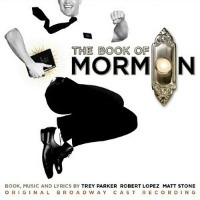 Original Broadway Cast, 2011 (Ghostlight)
Original Broadway Cast, 2011 (Ghostlight)  (4 / 5) When it was announced that the creators of South Park were writing a Broadway musical, with one of the songwriters of Avenue Q, no less, everyone expected that the show was going to be both shocking and hilarious. But the surprise here was that Trey Parker and Matt Stone (South Park) and Robert Lopez (Avenue Q) wrote a stellar musical comedy that was traditional in many ways. Yes, it’s shocking in its profanity and contemporary in its subject matter: two missionaries go to Uganda in the hope of converting villagers to Mormonism. But rather than try to reinvent the wheel with The Book of Mormon, Parker, Stone, and Lopez chose to adhere to tried and true musical theater structure in the style of the Golden Age, and to have fun within it. The cast is strong, each member giving a fully defined, wonderfully well sung performance. Andrew Rannells and Josh Gad, as the two central Mormon characters, make a good team, with Rannells doing the majority of the vocal heavy lifting. Gad is also a strong singer, though his comedic antics can occasionally be grating. Robert Lopez proved with Avenue Q that he has an ear for melody, but here his work is even more inventive while being filled with musical pop culture references to everything from the Osmonds in “All-American Prophet” to The Lion King (a running joke in the show) in “Hasa Diga Eebowai.” Each song has a distinct flavor, and yet the score doesn’t feel disjointed. Stephen Oremus’s orchestrations –played by 23 musicians on the cast album, as compared to nine in the production — match Lopez’s level of invention. As is the case with the best musical comedies, because the score is so reliant on the book, not every song shines as brightly on the recording as it does in the theater (for example, “Making Things Up Again”). But this a minor gripe. The lyrics — by Parker and Stone, with contributions from Lopez — are crass, colorful, and hilarious, yet with a surprising amount of heart. The show wouldn’t have worked if the creators had decided to be condescending to their characters and to the audience, but thankfully, this was not the case. — Matt Koplik
(4 / 5) When it was announced that the creators of South Park were writing a Broadway musical, with one of the songwriters of Avenue Q, no less, everyone expected that the show was going to be both shocking and hilarious. But the surprise here was that Trey Parker and Matt Stone (South Park) and Robert Lopez (Avenue Q) wrote a stellar musical comedy that was traditional in many ways. Yes, it’s shocking in its profanity and contemporary in its subject matter: two missionaries go to Uganda in the hope of converting villagers to Mormonism. But rather than try to reinvent the wheel with The Book of Mormon, Parker, Stone, and Lopez chose to adhere to tried and true musical theater structure in the style of the Golden Age, and to have fun within it. The cast is strong, each member giving a fully defined, wonderfully well sung performance. Andrew Rannells and Josh Gad, as the two central Mormon characters, make a good team, with Rannells doing the majority of the vocal heavy lifting. Gad is also a strong singer, though his comedic antics can occasionally be grating. Robert Lopez proved with Avenue Q that he has an ear for melody, but here his work is even more inventive while being filled with musical pop culture references to everything from the Osmonds in “All-American Prophet” to The Lion King (a running joke in the show) in “Hasa Diga Eebowai.” Each song has a distinct flavor, and yet the score doesn’t feel disjointed. Stephen Oremus’s orchestrations –played by 23 musicians on the cast album, as compared to nine in the production — match Lopez’s level of invention. As is the case with the best musical comedies, because the score is so reliant on the book, not every song shines as brightly on the recording as it does in the theater (for example, “Making Things Up Again”). But this a minor gripe. The lyrics — by Parker and Stone, with contributions from Lopez — are crass, colorful, and hilarious, yet with a surprising amount of heart. The show wouldn’t have worked if the creators had decided to be condescending to their characters and to the audience, but thankfully, this was not the case. — Matt Koplik

